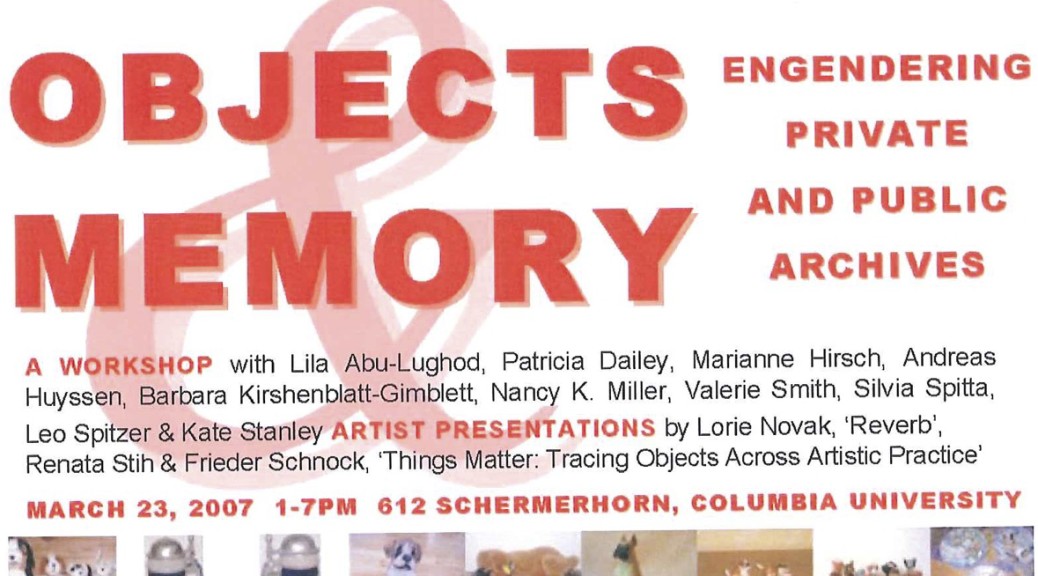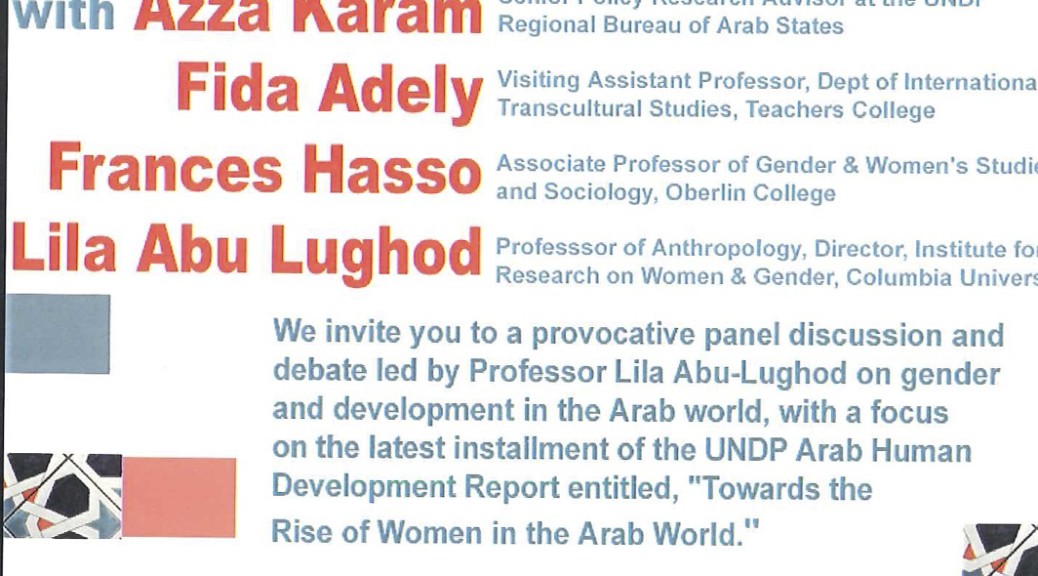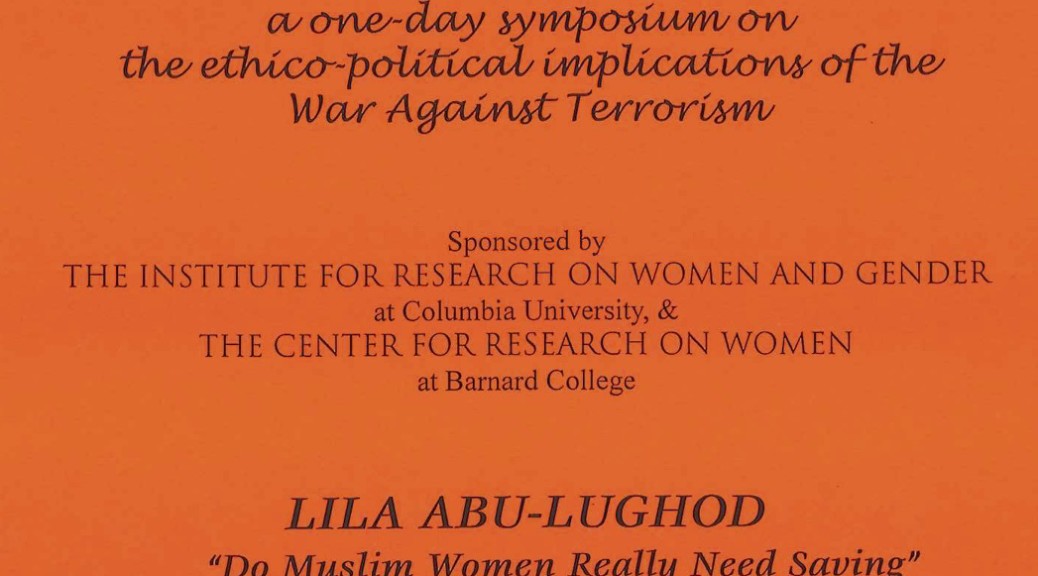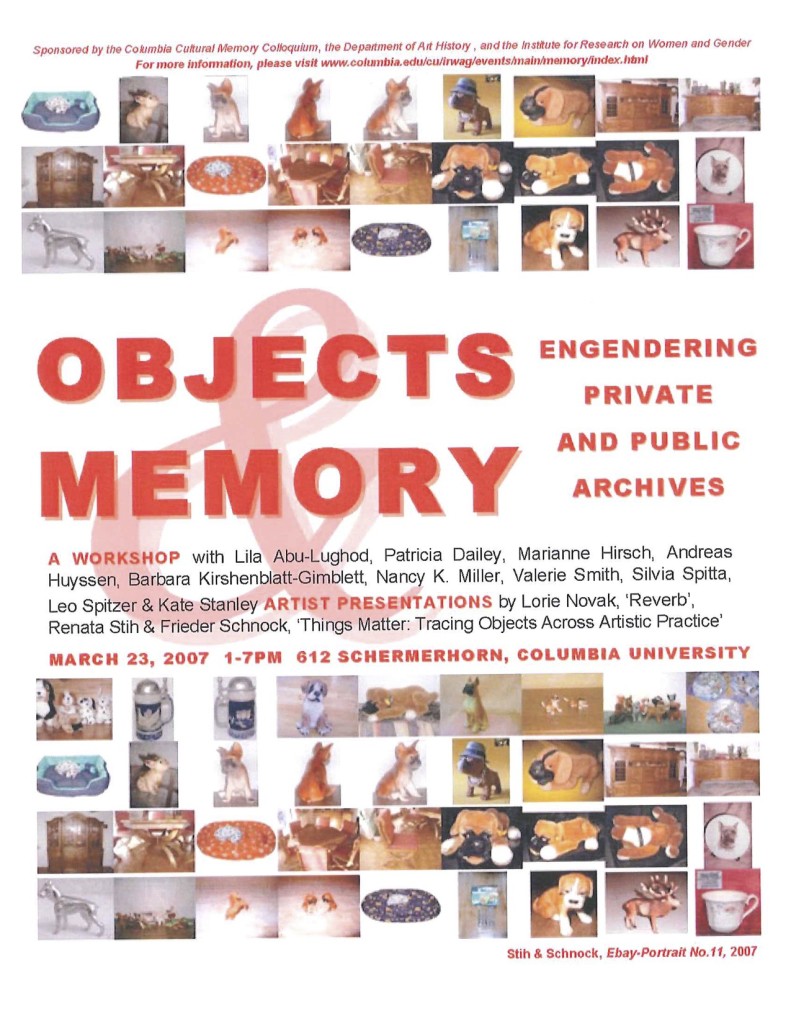
Category Archives: Lila Abu-Lughod
Empowering Arab Women?
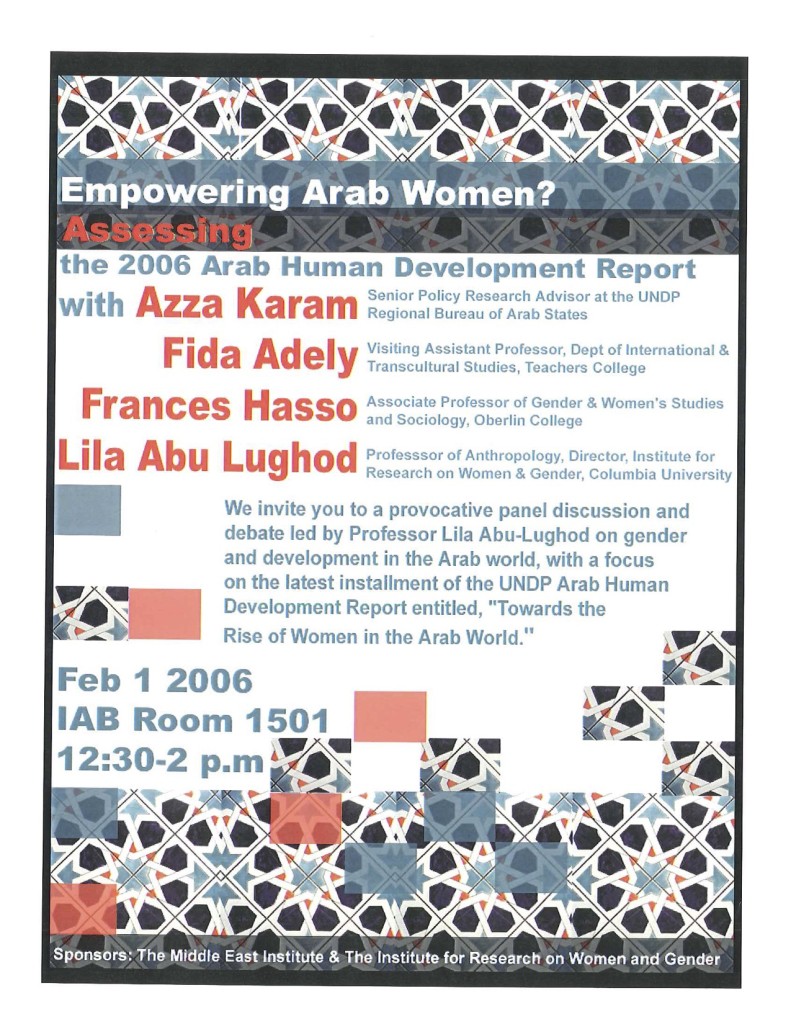
Responding to War
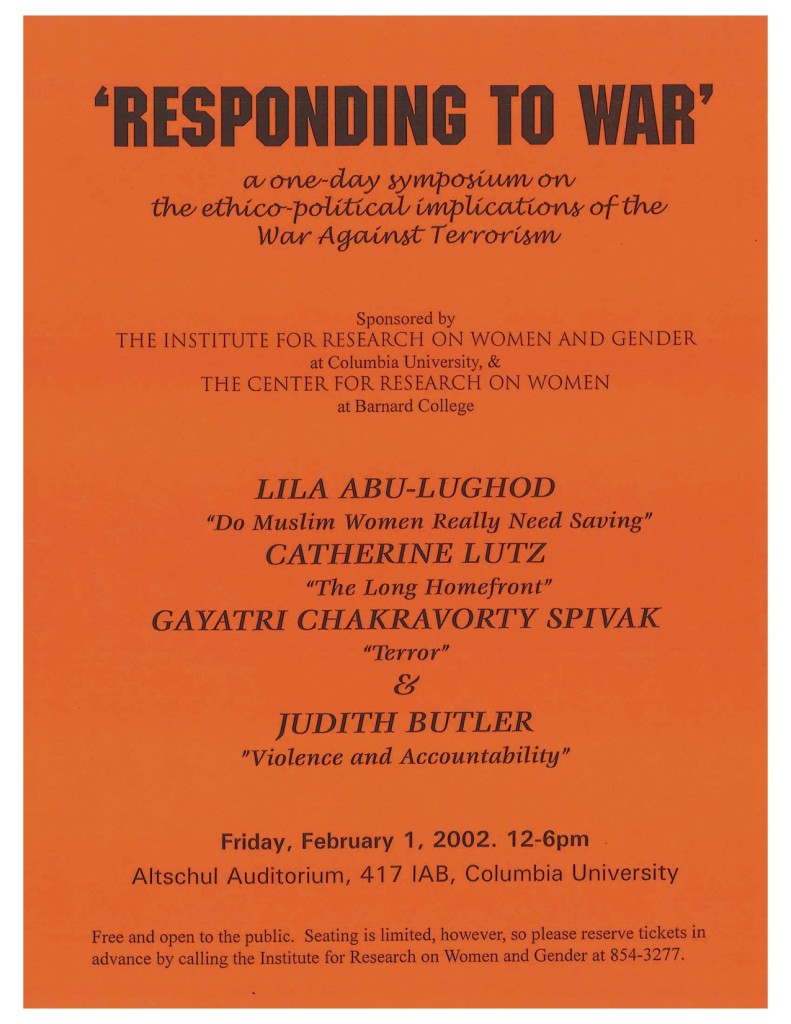
“It was being in this context at IRWGS that broadened the kind of work that I did…”
LILA ABU-LUGHOD
Joseph L. Buttenwieser Professor of Social Science
IRWGS Core Faculty
IRWGS Director, 2004-07
I was very excited about the anthropology department because it was the biggest thing that had happened in anthropology in the country. We won’t go into the reality versus the fantasy, but I came. Then I was half in IRWAG, and it was very small. There were only two of us joint people, who had half of our teaching there. But I was amazed at this group of women faculty that I found here who were just so institutionally savvy, so committed to this project even though it was all volunteer time for them. Thinking about how to make it good. They wanted the highest standards, but recognizing Columbia’s limitations in terms of powerful departments. People had to really be wanted in their discipline. That’s the brilliance that they had, I think, that they wanted the departments to be totally invested in this hire, and so they involved them from the beginning. They wanted the senior person to be wanted in their department. As an anthropologist, I was somebody who would bring something. As a historian, what more could you want than Alice Kessler-Harris? That was their strategy. A lot of programs flounder because you get faculty that the departments don’t really want. It means that some people can’t be considered, like the kind of cutting edge of feminist studies, which is very interdisciplinary, or cultural studies, since the scholars don’t quite fit in departments. We couldn’t hire people like that at Columbia, so we’re all people who are very well respected in our disciplines but who also have some relationship to women’s studies and sexuality studies.
So I came here. That was very different world for me, and my work actually changed. I always tell the story that probably the article I am most famous for now is this little piece that was called “Do Muslim Women Really Need Saving?” It’s taught in University Writing and all over. It was for a teach-in that IRWAG did. Roz Morris was the director then. There was the invasion of Afghanistan after 9/11 and she organized what she called a Forum on War. Gayatri Spivak spoke, and Judith Butler and Cathy Lutz, and I can’t even remember who else. Roz asked me, and I said, “Oh, no. I work on Egypt. What do I know about Afghanistan?” She looked at me like, “You don’t have anything to say?” I felt so ashamed. I only spoke from my deep knowledge, and our knowledge is ethnographic and it’s very specific. I thought, “Well, I’m sure I have something to say.”
So I wrote this talk for that event, which was to me kind of like Middle East/Anthro 101. I put together all the pieces that I knew, and I thought through a few more issues and it was just—it ended up being in the book that I published last year called Do Muslim Women Need Saving? I feel like it was being in this context at IRWGS that actually broadened the kind of work that I did, taking it beyond anthropology, beyond Middle East studies. I had to think: how could I reach a different audience with what I knew, but really directed at feminist issues?
“…a space for intellectual work"
LILA ABU-LUGHOD
Joseph L. Buttenwieser Professor of Social Science
IRWGS Core Faculty
IRWGS Director, 2004-07
I’ll tell one story that I think is really important in terms of this history, because I don’t know if anybody else would remember it this way. I became director and we had our first Executive Committee meeting. I said, “Okay. Here I am. What are we going to do?” Somebody asked, “So, Lila, what would you like to do?” I was like, “Me? Oh, I’ll just do whatever you want. I’m just taking care of this thing.” Then I said, “Well, there’s one little thing that I really think was sad that it’s gone.” There was this thing called the Bunting Institute, which was an advanced study center at Radcliffe that was a very important institution for women scholars in the old days. It was for, just before tenure, junior women scholars to have a year to work on their books. It was interdisciplinary. They had a wonderful weekly seminar. I never got to go there, but it was life changing for all the women who had ever partaken in it.
I said, it’s really sad because it closed. It was merged into Harvard and became the Radcliffe Institute, which has men and women. It’s just a normal advanced study center, which is fine, but that was a very special thing because it recognized the special problems women face in the academy. I said, “It’s really too bad. It’d be nice to have something like that here, at Columbia. Why can’t we have an advanced study center?”
We talked a lot about it and we said: In the twenty-first century, you don’t have it just for women anymore. We don’t want to compete with other units that are kind of struggling at Columbia around race, like IRAAS [Institute for Research on African American Studies]; and CSER [Center for the Study of Ethnicity and Race] was just starting. Why don’t we do it with them around the question of difference? Gender is one of them but there are others. All of these units are sort of organized around identity categories, which we theoretically don’t like, but they’re all people who struggle. Scholars who struggle in the academy, who aren’t mainstream, who work on things that are not as valued, who have a lot of demands on their time by students of color or women who turn to them. They do a lot of extra work. So shouldn’t they have a space for their intellectual work, and not just always doing bureaucratic things together and fighting for resources? A place to nurture our scholarship?
That was my idea. We worked on it and we had the ARC report. Luckily, we had the right people come in from outside who were shocked that we didn’t have a research institute. So they supported us and we got the Center for the Study of Social Difference.
“This is a political history…”
LILA ABU-LUGHOD
Joseph L. Buttenwieser Professor of Social Science
IRWGS Core Faculty
IRWGS Director, 2004-07
I think our motivation for getting this oral history project is to document how we did our work because this needed to be done here. We’re all in it for a much more political reason and we want that documented…the story we want to tell is the story of how we built this gender institute and kept it a good place and what kind of difference we were trying to make at Columbia. That’s the story we wanted to tell that should be documented because that might all get lost. It’s all, “I remember that Jean [Howard] said this and they did that.”
We want to tell the story of this political history of people who are committed to a certain project and work together to make that happen. It’s also intellectual, but it’s not personal. It is gratifying. These are people I really love and respect, and, of course, because it’s so collegial and such a rare collegial space here, I love that. I cherish that. It is personally meaningful that I go into the room and everybody who walks in, I feel happy to see them. You don’t feel that way everywhere you go. Everybody has goodwill and good faith towards it. That’s rare but partly, I think, because we’re not competing for any resources and there’s a political project as there is a problem—when we have all white men running this institution that we all live in and we know the women’s salaries are lower and we know the women never get to be on Riverside Drive [indicating preferred faculty housing], they get housing elsewhere. You see the inequalities so we’ve got to do something about that, as well as intellectual work of really building a scholarly field and working in it.
“…we need an intellectual space”
LILA ABU-LUGHOD
Joseph L. Buttenwieser Professor of Social Science
IRWGS Core Faculty
IRWGS Director, 2004-07
Many of the people who still don’t have lines in IRWGS we consider main, main members of our community, like Jean Howard. She doesn’t have an official line there, but that’s one of her big homes. A lot of people were committed but a lot of people drifted off and worked on other institutes, but then we were anchored by the four lines, with half of our teaching obligation and administrative is in IRWGS, and now there are six, six or seven. So that’s pretty stable, and they’re major, senior people. There were no tenure battles. Many departments flounder over supporting or not supporting a junior person. We didn’t have any of that. We don’t have admissions. We’ve resisted from the beginning. We don’t want to have a PhD. We don’t even want an MA. We like it the way it is—it’s a place people go to because they genuinely want to be there, because they care about it, and it doesn’t get caught up in this bureaucratic stuff and fighting over resources. Why not have a space like that? We have enough of it in our own departments, so let’s have a place that’s not like that. I think most people feel that way about IRWGS, that you don’t have any of that going on.
I think a lot of people feel we need an intellectual space. Not all departments are intellectual spaces for people. There are many departments that are problematic for people. Either they don’t fit in them or there are nasty histories. One’s department is not actually always the intellectual center for you and you have interests that actually go well with other people’s interests who are not in your discipline. This is an opportunity to follow the themes of your research with people who are interested in the same things.
We think this is all part of gender studies too. It’s enriching what IRWGS does and giving opportunities to IRWGS faculty to have conferences, to have working groups, to develop ideas. I know it comes up there and we know it, because we know how much effort it took to start the thing. Sometimes we think, look, why isn’t Women Creating Change under IRWGS and just skip CSSD [Center for the Study of Social Difference]? But then it would have to be curricular. IRWGS is a curricular unit. It teaches undergraduates. It has a graduate certificate and it does public programming. That’s what it does. The research side had never been part of it. All that research is done now through CSSD.
“…these are our collaborators, these are equal partnerships”
LILA ABU-LUGHOD
Joseph L. Buttenwieser Professor of Social Science
IRWGS Core Faculty
IRWGS Director, 2004-07
The Global Center directors had a retreat in Paris this December. They were thinking about cross-network programming, that there should be themes across the centers. Not each center just doing its own thing. Were there issues that would be interesting to do across centers? One of the ideas they came up with was they thought gender would be an interesting topic, so they came back to us, and we said, “Yes, we can do that for you.” We exist, Women Creating Change, to work with the Global Centers. We brainstormed a bit to produce some ideas for the network, to work in collaboration with them, of themes that might be good cross-center themes.
We came up with four themes that built on projects of CSSD already and things that had happened at the Global Centers, and we came up with four. One was called Making Cities Livable: Gender, Displacement and Women’s Strategies, because we have two projects that work on gender and cities. I worked on this one, Reframing Violence Against Women, because my project is ending, on Muslim women and religion and family law and women’s rights with a couple of colleagues in the Middle East.
The third theme was Women Mobilizing Memory, which is the project that Marianne and Jean have been doing. They worked in Chile with Chilean colleagues on the aftermath of political violence there. They went to Istanbul in September, and they’re probably going elsewhere. It’s about women’s activism around memory and around reparations, a whole set of things—redress about past atrocities and political violence. It’s activist women and artists and theater performers and all of that. It’s been an amazing project, and they would love to continue it and thought maybe some of the Global Centers would be interested. Then the final one—Alice Kessler-Harris has been running a project, Social Rights After the Welfare State. She started it in the U.S. and then they had comparative meetings in Europe, which turned out to be incredibly interesting, in Germany and France, the old welfare states.
So there could be whole new initiatives with the Global Centers, with international colleagues, which is what we really love, our colleagues. You don’t just export knowledge the way some of these other Columbia institutes do. Actually these colleagues know more about their regions than we do. These are our collaborators, these are equal partnerships, and that’s really been wonderful for my projects where I always have mostly people from the Arab world, the Middle East, in those workshops. Hopefully this will be the next phase of what we do through CSSD.

